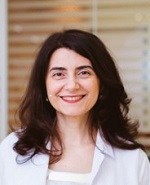Brachytherapy training survey among radiation oncology residents in Europe - PDF Version
Alina Emiliana Sturdza, Marianne Stephanides, Ina Jurgenliemk-Schulz, Jesper Grau Eriksen, Kim Benstead, Peter Hoskin, Stefanel Vlad, Alexandre Escande, Stefanie Corradini, Johannes Knoth, Henrike Westerveld, Luca Tagliaferri, Dina Najjari-Jamal, Katarzyna Konat-Baska, Vesna Plesinac, Li Tee Tan, Remi Nout, Vratislav Strnad, Peter Niehoff, Bradley R Pieters, Kari Tanderup, Mitchell Kamrava
Radiother Oncol. 2022 Dec; 177:172-178. doi: 10.1016/j.radonc.2022.10.030. Epub 2022 Oct 31
What was your motivation for initiating this study?
Brachytherapy (BT) is an essential tool in the management of multiple disease sites. However, structured training and assessment of residents and practising physicians in the performance of BT is lacking in Europe. Consequently, the status of resident BT training in Europe over the past 10 years is not known.
In some countries, radiation oncology is a separate training speciality, while in others it is part of training in clinical oncology. In order to investigate the state of BT training, a survey was sent to European radiation or clinical oncology residents to improve their understanding of the current education modalities and potential barriers to residents feeling comfortable with the practice of BT after their training.
What were the main challenges during the work?
The main challenges were being able to find a registry of the trainees in radiation oncology and getting responses. The survey was distributed after the identification of trainee representatives through national radiation oncology/clinical oncology societies. It was sent via email on two separate occasions (November 2019 and February 2020). The survey was to be completed anonymously, respondents were not able to review or change their answers, and only completed questionnaires were analysed.
What were the most important findings of your study?
A total of 445 residents (31% of the possible total) in 21 European countries responded to the survey. The most important finding was that 60% of the respondents considered that the ability to perform BT independently at the end of residency was very or somewhat important. It was found that 34% of senior residents were confident that they could join a BT practice at the end of their residency. The barriers that were reported the most regarding the achievement of independence in BT were lack of appropriate didactic/procedural training from supervisors (47%) and decreased caseload (31%). Additionally, two-thirds of respondents reported that their programmes lacked a formal BT curriculum and standardised training assessment.
What are the implications of this research?
As a consequence of these findings, an educational task force within the Groupe Européen de Curiethérapie-the European SocieTy for Radiotherapy and Oncology (GEC-ESTRO) was established. The purpose of this group is to create a structured fellowship in various site groups, which should be pursued in centres of excellence in BT training. A parallel goal is to finalise a specific log book/curriculum for resident BT training in order to meet the requirements for a good education in the field. Our aim is to finalise this initiative by mid-2023.

Alina Sturdza
Medical University of Vienna, Department of Radiation Oncology
Comprehensive Cancer Centre Vienna, Gynecologic Cancer Unit
Vienna, Austria